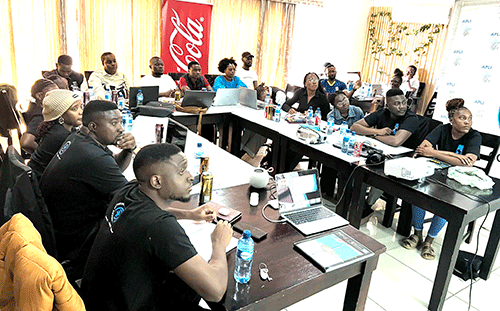The African Pathfinder Leaders’ Initiative (APLI) 2025 fellows have begun their fellowship journey, engaging in a series of dynamic knowledge-sharing sessions led by industry professionals. These sessions addressed a variety of subjects, including the transition to skills-based organisations, wellness, market research, public speaking mastery and the significance of achieving emotional debt-freedom.
Mechanical engineer Michael Nauta stated that the market serves as the cornerstone for any product or service, and the choice of which market to enter can be informed by research and fundamental principles or shaped by history, proximity or a sudden insight.
“Even after selecting a market, it remains critical to conduct thorough research and formulate effective strategies for engagement,” emphasised the enthusiastic educator.
He pointed out that fellows should clearly define their target audience using demographic factors like age, gender, income and location, as well as psychographics related to lifestyle, preferences and behaviours.
He highlighted the importance of developing customer personas to create profiles of ideal clients.
The APLI fellowship exemplifies a leading initiative aimed at empowering young Namibians to act as catalysts for positive transformation. It provides them with the necessary skills, tools and resources to initiate or grow impactful projects within their communities.
Human resources’ consultant and job search coach Lisa Matomola remarked on the brilliance, curiosity and ambition of the young Namibians.
“During my recent presentation to the APLI fellows, I posed a simple yet telling question: Which companies do you aspire to work for?” she reflected.
The responses included well-known names like Google, Microsoft and Amazon filling the room. Matomola observed that there is no ambiguity with this generation as they approach their career choices with purpose, knowledge and professional networks.
“For those of us in talent acquisition, human resources’ management and leadership, this serves as a wake-up call. To attract and keep top local talent in Namibia, we must elevate our standards: enhance our employee value proposition (EVP) by articulating what we truly offer beyond just a salary. We need to highlight our purpose and impact, as young professionals are eager to contribute something significant. Lastly, we should provide flexibility, development opportunities and pathways for growth,” she asserted.
Matomola emphasised the critical nature of growth and development, while also highlighting the expanding global reach of the talent market.
“The world is our marketplace, and attracting the best talent cannot rely solely on traditional benefits like location or necessity,” she said, stressing that businesses must compete on a global scale, even when hiring locally.
She acknowledged the challenges this presents, but also recognised the opportunity to reframe how organisations position themselves to attract future leaders.
Information and technology officer Coenraad Coetzee recognised the rich talent pool in Namibia, and the need to invest in local leadership potential.
“Transformational leadership entails striving for outstanding performance and fostering tangible change within an organisation, as well as leading in a manner that inspires, motivates and influences superiors, peers and subordinates across various contexts,” he told the fellows.
Coetzee noted that this focuses on people, and how one’s leadership approach can inspire others to surpass their potential and enable meaningful change in their organisations, communities and personal lives.
The discussion highlighted the critical role of effective leadership in empowering individuals to unlock their potential and make valuable contributions to their organisations and communities.
-psiririka@nep.com.na



